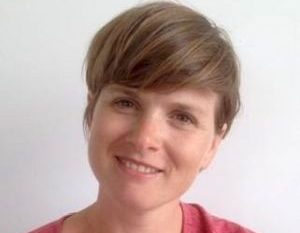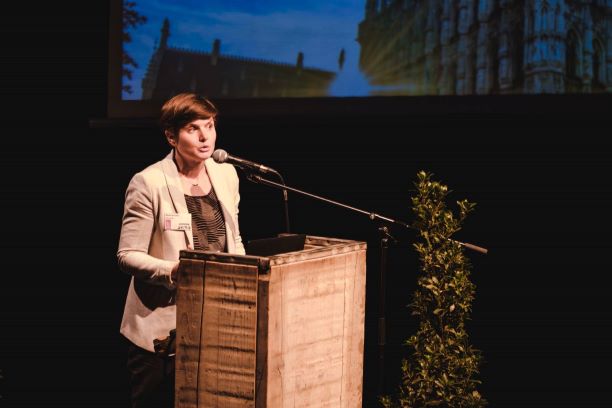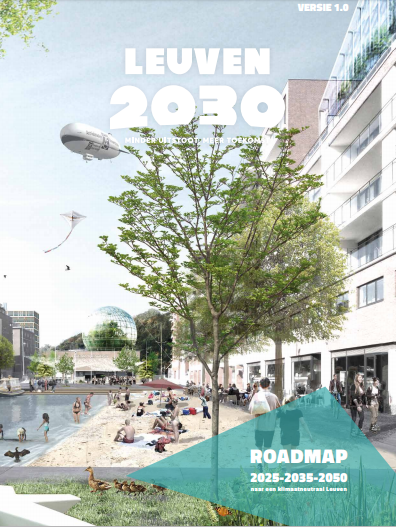Leuven Lessons: High hopes, high risk, and a medieval city as a modern construction site.
Michèle Jacobs, Stakeholders relations Leuven 2030

“I do it for my children and I want to be able to look them in the eye and tell them that I tried and that our family tried.”
I am about halfway through the interview with Michèle Jacobs when she says this and it leaves me a bit stunned. It is said in a matter of fact tone. It is not a declaration or a rallying cry – just a simple unavoidable truth heavy with implications. It is also a powerful insight into one woman who is trying to remake Leuven as the poster child for the shared energy transition.

Leuven is a medieval city of 100,000 people just twenty minutes from Brussels, Belgium. It’s an old city, the local university was established in 1425, and perhaps coincidentally it is also home to the world’s largest brewer. More importantly, the city is home to Leuven 2030, an NGO responsible for stimulating civil society, local business, local government and knowledge institutions to take ownership of the necessary climate action in their sector and in this way transform Leuven into a climate neutral city. Their plan is ambitious, and making it happen falls on the shoulders of the 20-strong team at Leuven 2030 including Michèle Jacobs, stakeholder manager.
In Leuven, that means engaging with citizens in a bottom-up approach but also knowing when to change track and move top-down for speed. It is also her responsibility to ensure that local employers, big business, the university, city staff, schools and just about anyone else with a stake in the city has a voice and is committed to change.
“The resistance to change is with every stakeholder. It’s a changing of habits, how we live, what we find normal. Citizens can sometimes feel aimed at and it is always the ‘other’ who needs to change,” Jacobs explains. “What we need is a more systemic change.
The political scientist worked in community development in nearby Brussels for 8 years before moving to Leuven 2030.
“I’ve always been interested in the wisdom of crowds and what can grow from below,” says Jacobs. “But we’ve really touched the boundaries of bottom-up in playing our role as Leuven 2030. That role evolved over the years. What started as a bottom-up movement changed to much more top-down work as we get expert level input in the process of drafting the Roadmap. Now, as we move to implementation, we are looking for opportunities to broaden the process up again. Our team is small and we have to remain an accelerator rather than an inhibitor.”
And when she describes what Leuven is accelerating towards it does sound wonderful.

“By 2050 we want to see more bike and tramways, climate neutral houses and building, more green in the streets with vegetable gardens on roofs and street corners as well as pv on roofs and more life in the streets with repair cafes and things like that, other technological answers we don’t yet know today”
Getting there, however, is fraught both with risk and opportunities
But it’s not the immediately visible changes she wants to focus on.
“The systemic change we need on different societal domains (modal shift, waste, consumerism and social equality) are more difficult to see. But we will only succeed when we have equality on a social level – at every level. Otherwise we will only succeed in polarisation. We need to take everyone with us. And it’s not just Leuven, but every city should get there.”
Leuven is doing its part to help other cities as a ‘Lighthouse City’ as part of the Tomorrow Project which aims to share best practices from leading cities across Europe.
I comment that the scale of the changes seems incredibly daunting.
“True, but I couldn’t imagine doing anything else or enjoying something more than being in the cockpit to move this project forward. I am constantly learning.”
One of the biggest lessons has been in keeping citizens informed and engaged but without exhausting them over the course of such an epic undertaking.
“Not every stakeholder needs to be involved from the beginning to the end. Our main approach is to keep people involved through action. That is our vision. We want to go beyond information and sensibilisation to practice and action.”
Action is something that has been in short supply globally up until now.

